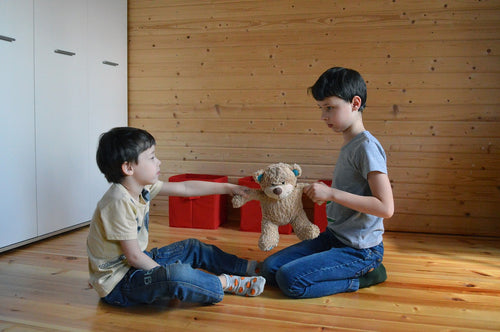While extremely worrying and often frustrating, sibling rivalry between toddlers and even older children, is normal, but it can be tough for parents to manage. Whether you have a blended family with step sisters and brothers or siblings who constantly fight, managing sibling rivalry can be tricky. Fortunately, there are strategies parents can use to help lessen the amount of fighting between kids and ensure that everyone gets along.
In this article, we'll discuss sibling rivalry, why it happens, and provide 10 parenting tips for soothing the chaos!
What is Sibling Rivalry?
Sibling rivalry is defined as competition or conflict between siblings. This can range from sharing toys and arguing over small matters to bigger issues like vying for attention and competing for parental approval.
Sibling rivalry is a normal part of growing up, especially in families where children are close in age. It's often the result of kids comparing themselves to their siblings, leading them to feel jealous or insecure. However, it's important to note that siblings who fight all the time are not necessarily a sign of family dysfunction; it can be seen as an opportunity for children to learn how to handle social conflict and practice negotiating skills with their peers.
10 Parenting Tips for Soothing Sibling Rivalry
1. Set Clear Rules:
Ensure your children understand the limits of acceptable behavior and establish clear consequences for breaking those rules. This will help kids learn to take responsibility for their actions and give them a sense of security, knowing that boundaries are in place.
2. Show Unconditional Love:
Let your kids know that you love each of them unconditionally, no matter what happens between them. This will help foster healthy self-esteem and prevent siblings from feeling like they need to compete for love or attention.
3. Encourage Positive Interactions:
Whenever possible, try to create situations where siblings can interact positively with one another, such as playing together or taking part in joint activities. This will help strengthen their bond and allow them to practice social skills.
4. Avoid Favoritism:
It's important to treat each child fairly and not show favoritism when disciplining or rewarding your kids. Make sure your children feel valued and appreciated, no matter which one misbehaves at the time.
5. Defuse Conflict:
When siblings get into a fight, intervene peacefully by helping them talk through their issues and devise a solution that works for everyone involved. This will help teach problem-solving skills and allow them to work out conflicts independently.
6. Model Positive Behavior:
Kids look to their parents as role models, so be sure to demonstrate positive behavior and show them how to handle disagreements respectfully.
7. Celebrate Differences:
Take time to recognize and celebrate each of your kids' unique qualities rather than focusing on what they have in common or what one sibling has that another doesn't. This will help create an environment of peaceful acceptance and understanding within the family.
8. Encourage Independence:
Give siblings space and let them know that it's okay for them to have different interests and hobbies from one another. This will help foster individual identity and give them opportunities for personal growth without feeling like they need to compete with their siblings.
9. Take Breaks:
If things get too heated between siblings, step in and give them a break from each other. Letting them have some alone time can help diffuse the tension and allow them to cool off before trying to resolve the issue.
10. Seek Professional Help:
If sibling rivalry is causing significant stress or disruption in your family, consider talking to a mental health professional for additional guidance on how best to handle the situation.
Conclusion
Siblings who fight all the time is a natural part of growing up, but it doesn't have to create chaos at home. By setting clear rules, demonstrating unconditional love, and using the above parenting tips for soothing sibling rivalry, parents can foster healthy relationships between their children and help keep peace in the family.
Image by Victoria_Watercolor from Pixabay

















